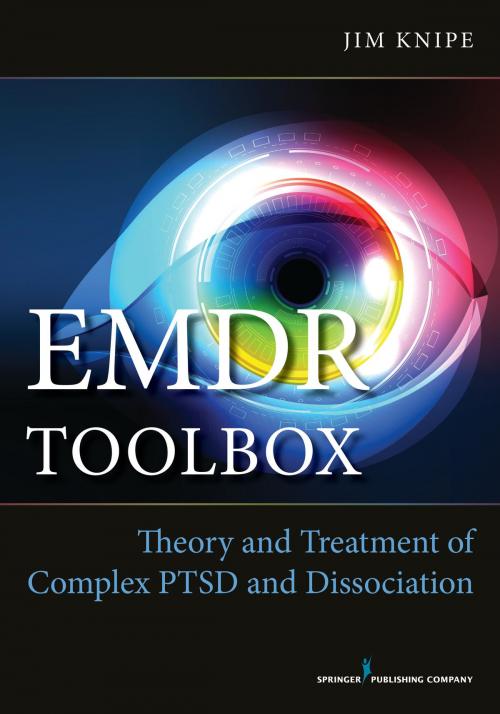EMDR Toolbox
Theory and Treatment of Complex PTSD and Dissociation
Nonfiction, Health & Well Being, Psychology, Counselling, Mental Illness, Clinical Psychology| Author: | James Knipe, PhD | ISBN: | 9780826171276 |
| Publisher: | Springer Publishing Company | Publication: | August 5, 2014 |
| Imprint: | Springer Publishing Company | Language: | English |
| Author: | James Knipe, PhD |
| ISBN: | 9780826171276 |
| Publisher: | Springer Publishing Company |
| Publication: | August 5, 2014 |
| Imprint: | Springer Publishing Company |
| Language: | English |
"[R]eading this book has given me a whole host of new ideas about working with complex and dissociative clients... Clear and engaging, peppered with relevant case histories, this book would make an important addition to anyone's EMDR-related book collection." -- Dr. Robin Logie, EMDR UK & Ireland
This book is the first to bring together in one volume an overview of the principal issues in treatment of dissociative disorders in complex PTSD, and a description of the integration of specific EMDR-related interventions or "tools" with other psychotherapeutic treatments. These tools can significantly extend the therapeutic power of EMDR-related methods. Each intervention is examined in detail with accompanying transcripts illustrating the nuances and variations in how the intervention is applied. It is written by a highly esteemed EMDR scholar, trainer, international speaker, and author who is an EMDRIA-designated "Master Clinician."
The book discusses how the concepts and vocabulary of other models of dissociation (particularly the Theory of Structural Dissociation of the Personality, and the Internal Family Systems model) translate directly into EMDRís Adaptive Information Processing language. It presents detailed descriptions of specific EMDR-related tools that are useful in facilitating and safely accelerating therapeutic progress with clients suffering from Complex PTSD. These include such standard EMDR procedures as Trauma Processing and Resource Installation, several conceptual/cognitive/phenomenological models of dissociative personality structures and symptoms, and specific EMDR interventions for resolving dysfunctionally stored post-traumatic elements. The book will be of great value to therapists who wish to extend their use of basic EMDR with "easier" clients to using it effectively with more complex clients.
Key Features:
- Provides a theoretical framework to guide assessment and treatment of clients with Complex PTSD
- Serves as a "hands-on" resource for using specific EMDR procedures
- Describes each intervention in detail, illustrating the nuances and variations in different applications
- Includes specific "AIP" tools, actual therapy scripts, and client drawings
- Covers DSM-V PSTD criteria
"[R]eading this book has given me a whole host of new ideas about working with complex and dissociative clients... Clear and engaging, peppered with relevant case histories, this book would make an important addition to anyone's EMDR-related book collection." -- Dr. Robin Logie, EMDR UK & Ireland
This book is the first to bring together in one volume an overview of the principal issues in treatment of dissociative disorders in complex PTSD, and a description of the integration of specific EMDR-related interventions or "tools" with other psychotherapeutic treatments. These tools can significantly extend the therapeutic power of EMDR-related methods. Each intervention is examined in detail with accompanying transcripts illustrating the nuances and variations in how the intervention is applied. It is written by a highly esteemed EMDR scholar, trainer, international speaker, and author who is an EMDRIA-designated "Master Clinician."
The book discusses how the concepts and vocabulary of other models of dissociation (particularly the Theory of Structural Dissociation of the Personality, and the Internal Family Systems model) translate directly into EMDRís Adaptive Information Processing language. It presents detailed descriptions of specific EMDR-related tools that are useful in facilitating and safely accelerating therapeutic progress with clients suffering from Complex PTSD. These include such standard EMDR procedures as Trauma Processing and Resource Installation, several conceptual/cognitive/phenomenological models of dissociative personality structures and symptoms, and specific EMDR interventions for resolving dysfunctionally stored post-traumatic elements. The book will be of great value to therapists who wish to extend their use of basic EMDR with "easier" clients to using it effectively with more complex clients.
Key Features:
- Provides a theoretical framework to guide assessment and treatment of clients with Complex PTSD
- Serves as a "hands-on" resource for using specific EMDR procedures
- Describes each intervention in detail, illustrating the nuances and variations in different applications
- Includes specific "AIP" tools, actual therapy scripts, and client drawings
- Covers DSM-V PSTD criteria















